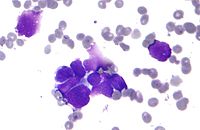
Photo from wikipedia
Merkel cell carcinoma (MCC) is a neuroendocrine skin cancer of the elderly, with high metastatic potential and poor prognosis. In particular, the primary resistance to immune checkpoint inhibitors (ICI) in… Click to show full abstract
Merkel cell carcinoma (MCC) is a neuroendocrine skin cancer of the elderly, with high metastatic potential and poor prognosis. In particular, the primary resistance to immune checkpoint inhibitors (ICI) in metastatic (m)MCC patients represents a challenge not yet met by any efficient treatment modality. Herein, we describe a novel therapeutic concept with short-interval, low-dose 177Lutetium (Lu)-high affinity (HA)-DOTATATE [177Lu]Lu-HA-DOTATATE peptide receptor radionuclide therapy (SILD-PRRT) in combination with PD-1 ICI to induce remission in patients with ICI-resistant mMCC. We report on the initial refractory response of two immunocompromised mMCC patients to the PD-L1 inhibitor avelumab. After confirming the expression of somatostatin receptors (SSTR) on tumor cells by [68Ga]Ga-HA-DOTATATE-PET/CT (PET/CT), we employed low-dose PRRT (up to six treatments, mean activity 3.5 GBq per cycle) at 3–6 weeks intervals in combination with the PD-1 inhibitor pembrolizumab to restore responsiveness to ICI. This combination enabled the synergistic application of PD-1 checkpoint immunotherapy with low-dose PRRT at more frequent intervals, and was very well tolerated by both patients. PET/CTs demonstrated remarkable responses at all metastatic sites (lymph nodes, distant skin, and bones), which were maintained for 3.6 and 4.8 months, respectively. Both patients eventually succumbed with progressive disease after 7.7 and 8 months, respectively, from the start of treatment with SILD-PRRT and pembrolizumab. We demonstrate that SILD-PRRT in combination with pembrolizumab is safe and well-tolerated, even in elderly, immunocompromised mMCC patients. The restoration of clinical responses in ICI-refractory patients as proposed here could potentially be used not only for patients with mMCC, but many other cancer types currently treated with PD-1/PD-L1 inhibitors.
Journal Title: Pharmaceutics
Year Published: 2022
Link to full text (if available)
Share on Social Media: Sign Up to like & get
recommendations!